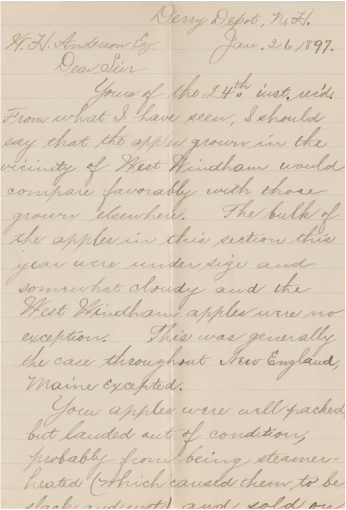|
At the turn of the twentieth century Windham was largely an agricultural community. The majority of the farms were small family-sized farms, many of which produced dairy products. Such farms operated with minimal hired help and rarely required the services of a hired manager. The farms were self sufficient; replacement animals were raised on the farms and fed the hay that was also grown on the farms. Aside from raising animals, some farmers grew and harvested apples. According to Rural Oasis the popular fruit would have been "packed in softwood barrels and loaded on the train for sale in a city or the apples were brought to one of the mills in town to be made into cider". In 1897 Charles McAllister received a letter from William H Anderson inquiring as to the apples produced on his West Windham property several months earlier. McAllister reported that "the apples grown in the vicinity of West Windham would compare favorably with those grown elsewhere". However, the majority of "the apples in [West Windham] this year were under size and somewhat cloudy". As the same conditions were true for the bulk of the apple crop of 1896 in New England, Anderson could not have been too upset that his Windham apples were far from exceptional. Maine was the only state spared from the dismal apple crop. McAllister continues his letter by reporting to Anderson that although his apples were well packed, they were received in poor condition. He concluded that this issue may have resulted from the apples being "steamer heated", which caused them to become "slack and wet". To make matters even worse, the crop was sold on a market that was already replete with apples, forcing Anderson's representative to sell them at a low price. McAllister also used the letter as an opportunity to attempt to sell Anderson wooden apple barrels that he had too much of a stock of. While one train car of the barrels had initially sold at 25 cents a piece, the price per barrel rose and the initial customer did not need the entire second car of barrels. McAllister instructed the purchaser to sell all the unwanted barrels at 30 cents apiece. It seems that the buyer had quoted Anderson 25 cents apiece for the barrels and McAllister agreed to honor this price even though he would take a loss between the cost of the barrels and their delivery at the West Windham Station. Although apple season was several months away, Anderson likely could not have passed up such a deal.
0 Comments
Leave a Reply. |
AuthorDerek Saffie is an avid Windham historian who enjoys researching and sharing his collection with all those interested in the history of the New England town. Archives
November 2019
Categories
All
|
